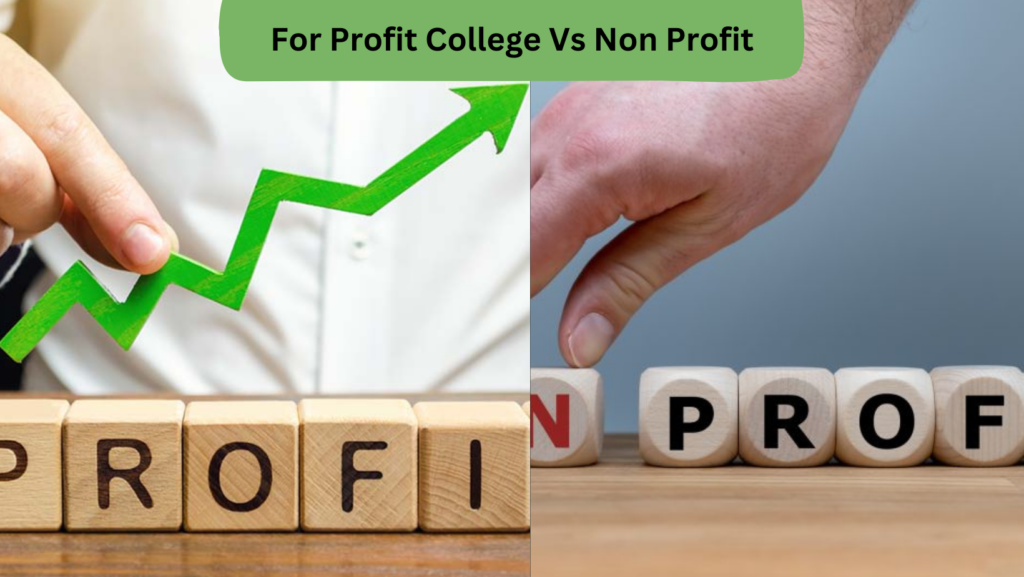In the bustling landscape of higher education, two distinct roads beckon the aspiring learner: the avenue of for profit college vs non profit stands out when making a decision. As you stand at this crossroads, the question arises: which path will lead to the destination of your educational aspirations?
Join us as we embark on an enlightening exploration of for-profit colleges versus non-profit institutions, unraveling their complexities, and shedding light on the perplexing choices that define modern education. From the corridors of profit to the corridors of purpose, let’s delve into the heart of this matter.
Contents
- 1 For-Profit Colleges: Profits and Learning in Tandem?
- 2 Non-Profit Institutions: Education with a Purpose
- 3 The Fork in the Road: Making an Informed Choice
- 4 Conclusion: For Profit College Vs Non Profit
- 5 FAQs: Unraveling the Choices
- 5.1 Q1. Do for-profit colleges offer recognized degrees?
- 5.2 Q2. Are non-profit institutions more affordable than for-profit colleges?
- 5.3 Q3. Do for-profit colleges prioritize profits over education?
- 5.4 Q4. Are non-profit institutions only for traditional degrees?
- 5.5 Q5. How do I decide between the two options?
For-Profit Colleges: Profits and Learning in Tandem?
Demystifying For-Profit Colleges
In the intricate realm of education, for-profit colleges emerge as dynamic entities fueled by the dual engines of education and revenue generation. These institutions wear the mantle of enterprises, intricately weaving the threads of learning and financial goals.
Unlike their non-profit counterparts, for-profit colleges bear the responsibility of not only educating students but also steering the ship towards profit generation. Picture them as the ambitious architects of the educational landscape, their blueprints crafted not only to lay the foundation of learning but also to erect the towering structure of financial growth, creating a unique symbiosis of academia and business acumen.
The Burstiness of Flexibility
A defining feature of for-profit colleges lies in their inherent burstiness, manifesting as a remarkable agility in responding to contemporary demands. These institutions are adept at crafting programs that seamlessly align with the ever-evolving needs of industries.
This responsiveness allows students to acquire skills that mirror the demands of a rapidly shifting job market. Much like a chameleon seamlessly adapts its colors to blend into its surroundings, for-profit colleges pivot and adjust their offerings to harmonize with the dynamic rhythms of economic trends, ensuring that graduates are equipped with the right tools to navigate the terrain of modern professions.
The Price Tag Puzzle
Amid the allure of agility and tailor-made programs that for-profit colleges extend, a puzzle of considerable weight emerges: the price tag. While these institutions dazzle with their burstiness, they are not exempt from a caveat – a substantial financial investment.
The cost landscape of modern education can indeed raise eyebrows, much like a puzzle whose complexity demands attention. Comparing this scenario to a choice between a premium sports car and a reliable sedan adds a layer of relatability.
Just as both vehicles promise distinct experiences, one luring with speed and the other offering steadfast reliability, their appeal comes attached with individual financial considerations. The analogy serves as a reminder that while unique features can captivate, the financial acceleration associated with for-profit colleges might require careful contemplation before steering towards this particular route of higher education.
Non-Profit Institutions: Education with a Purpose
The Heart of Non-Profit Institutions
Nestled at the core of non-profit institutions lies a profound purpose – the pursuit of education for the greater good. These institutions are guided by a noble mission that transcends financial gain, elevating the value of learning to its zenith. Within their hallowed halls, knowledge is cultivated with meticulous care, akin to a well-tended garden that blooms with wisdom.
Envision these institutions as beacons of enlightenment, steadfastly dedicated to nurturing intellectual growth and fostering a community driven by a collective thirst for understanding. Much like a lighthouse illuminating the path to knowledge, non-profit institutions radiate a luminous energy that encourages a deep and meaningful exploration of the world of ideas.
The Perks of Purpose
Within the nurturing embrace of non-profit institutions, a remarkable paradigm unfolds – an environment where purpose reigns supreme over profit. Here, the collective dedication to education is akin to a symphony conducted by purpose itself. Faculty members, much like skilled artisans, pour their energies into cultivating profound understandings of subjects, prioritizing the cultivation of knowledge over the allure of financial gains.
The analogy paints a vivid picture of a master chef meticulously crafting a dish, selecting each ingredient with utmost care to orchestrate a harmonious blend of flavors. Similarly, non-profit institutions meticulously curate the educational experience, ensuring that every nuance of learning is savored and appreciated, leading to a profound enrichment of minds and souls alike.
The Cost-Value Equation
As non-profit institutions stand as staunch advocates of purpose-driven education, their financial equation often extends a welcoming hand to students. The cost-value interplay they offer echoes the resonance of a well-calibrated timepiece. In this comparison, the intricate mechanism and meticulous craftsmanship of the watch justify its value without the embellishments associated with a premium brand.
Similarly, non-profit institutions emphasize the essential elements of education, ensuring that the investment made is proportional to the valuable knowledge and personal growth attained. The analogy reminds us that value is intrinsic and enduring, transcending the allure of superficial extravagance.
The Fork in the Road: Making an Informed Choice
Standing at the crossroads of higher education, the decision between for-profit colleges and non-profit institutions is akin to reaching a fork in the road, where two divergent paths unfold, each with its unique set of experiences and opportunities.
For-profit colleges stand ready to embrace the ever-evolving demands of industries, crafting programs that are in sync with the burstiness of modern workplaces. However, this path comes with a caveat—a more substantial financial commitment. On the other hand, non-profit institutions prioritize the holistic development of learners, weaving purpose into the very fabric of education.
Conclusion: For Profit College Vs Non Profit
As you embark on your educational odyssey, remember that both for profit college Vs non profit institutions have their merits. Your choice should align with your educational aspirations, financial capabilities, and long-term goals. Whether you choose the path of profit or the path of purpose, each step will shape your journey and contribute to your growth.
FAQs: Unraveling the Choices
Q1. Do for-profit colleges offer recognized degrees?
Yes, many for-profit colleges offer accredited degrees that hold value in the job market. However, it’s important to research and ensure accreditation for credibility.
Q2. Are non-profit institutions more affordable than for-profit colleges?
Non-profit institutions often have a reputation for being more affordable due to their mission-driven focus. However, tuition costs can still vary, so it’s wise to compare.
Q3. Do for-profit colleges prioritize profits over education?
For-profit colleges aim to balance education and profit. While they generate revenue, many also offer quality education. It’s crucial to research specific institutions and programs.
Q4. Are non-profit institutions only for traditional degrees?
Non-profit institutions offer a wide range of programs, including traditional degrees and specialized fields. Their emphasis on education extends to various disciplines.
Q5. How do I decide between the two options?
Consider your career goals, financial situation, preferred learning environment, and values. Both paths have strengths, so align your choice with what resonates most with you.






